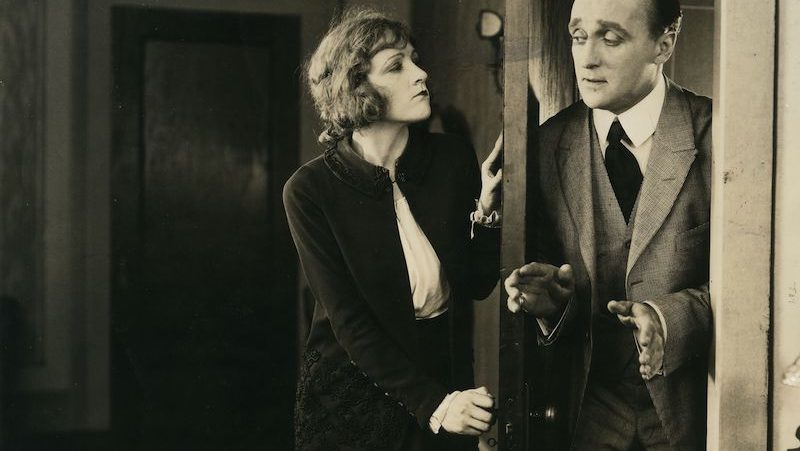From the pen of Anita Loos: American Aristocracy starring Douglas Fairbanks
and A Temperamental Wife with Constance Talmadge.
Two films showcasing the rediscovered Weimar-era star Ellen Richter, and the return of “Nasty Women”.
Today is Women’s Day at the Pordenone Silent Film Festival. Women in the forefront as producers, screenwriters, directors, actors and, as in the case of “Nasty Women”, women looking for trouble. The evening screenings at the Teatro Verdi offer a chance to deepen our acquaintance with Anita Loos, one of the most famous American screenwriters and the author of the novel Gentlemen Prefer Blondes, from which two films were made, including Howard Hawks’ celebrated 1953 comedy starring Marilyn Monroe and Jane Russell. A witty writer perfectly in sync with her time, Loos (1889-1981) and her husband John Emerson began a prolific collaboration in the later 1910s with Douglas Fairbanks, Sr. and later with Norma and Constance Talmadge. The Pordenone Silent Film Festival offers two gems from this golden period: American Aristocracy (1916) with Fairbanks, and A Temperamental Wife (1919), with Constance Talmadge. Loos focused on conveying a certain “sympathy for the star”, meaning that depending on the actor she was writing for, she always made an effort to highlight the attributes that the audience most appreciated. For Fairbanks, this meant his physical prowess, and Loos’ scripts always had him in constant motion; whereas for Constance Talmadge the main focus was her sensuality and the playful side of her charm.
Loos’ ability to adapt to each actor’s personality nourished a career that went well beyond the silent era and led to notable collaborations with stars such as Clark Gable, Jean Harlow and Joan Crawford. In the ‘50s she quit film and dedicated herself completely to literature.
The other important female-centered retrospective of the festival’s 40th edition rediscovers one of the most famous film personalities from the Weimar era, Ellen Richter. Although she appeared in over 70 films between 1913 and 1933, her immense popularity has been forgotten; it’s especially fitting that she be celebrated during our fortieth edition, given the festival’s longstanding role in reevaluating and championing neglected aspects of German cinema. With her dark complexion and exotic features, the Jewish-born Richter differed from traditional German beauty standards, so especially in the beginning of her career she was given roles as the “Other” and the foreigner, from a gypsy to a geisha. Her name then became synonymous with adventure-travel films, packed with action and usually shot on location. In a review of one of her films, Das Rätsel der Sphinx (1921), the writer Joseph Roth, chronicler of the fall of the Habsburg Empire, highlighted her Diva-esque dimension, commenting a bit waspishly that only when she forgot that a part was custom-written for her did she deliver moments of honesty.
Sunday’s programme at the Verdi starts at 10:30AM with two of her earliest surviving films: Leben um Leben (Life Upon Life), 1916, and Aberglaube (Superstition), 1919. It’s sobering to think of her career in this period as she approached the height of her popularity and art in collaboration with her husband Willi Wolff (also her director and screenwriting partner), for who could have foreseen that nearly two decades later the two would be forced to flee Berlin? With the advent of Nazism the couple moved first to Vienna, Richter’s birthplace, and then travelled about Europe until an affidavit from Ernst Lubitsch, written to the U.S. immigration authorities testifying to their perilous position, allowed them to cross the ocean and find safety. However their life in cinema was over.
This Sunday we’re welcoming back Nasty Women, those fractious females whose antics were celebrated in two influential series first screened at the Giornate in 2017 and 2019. Included in the programme titled “Contagious Revenge” are French and American shorts made between 1899 and 1914, including Laughing Gas from 1907, which stands out for featuring the African American actress Bertha Regustus.
Earlier in the day, as per tradition, young student musicians are in the spotlight taking part in our annual “Striking a New Note” event. This year students from the Pier Paolo Pasolini middle school of Pordenone, together with their peers from the Guglielmo Marconi music school of Conegliano, will be performing their very own accompaniment to two Charlie Chaplin shorts from 1914, His Musical Career and Laughing Gas. The programme kicks off at 2:30PM at the Teatro Verdi.
A “nasty boy”, played however by the child actress Maria Bay, can be seen in the “Rediscoveries and Shorts from the Cineteca del Friuli” screening. She’s the memorably mischievous brat in Giovanni Vitrotti’s Soap Bubbles from 1911. Also included in the Cineteca’s selection are Eleuterio Rodolfi’s Cenerentola (1913), the French Bigorno fume l’opium (1914) and Polidor cambia sesso (1918), in which comedian Ferdinand Guillaume dons drag. The French-Italian comedian, first known as Tontolini and then Polidor, had a lengthy career between the circus, theatre and cinema, appearing in almost 300 films starting in the 1910s and finishing in the age of Fellini and Pasolini.
The Cineteca’s shorts are included in our online programme, through MYmovies, where they will be available for 24 hours beginning Sunday at 5PM (local time), accompanied by Maud Nelissen. The evening online programme, starting at 9PM, features The Man from Kangaroo, a madcap adventure western directed by Wilfred Lucas. The great Australian athlete Reginald “Snowy” Baker plays the action hero in the first of three films we’re presenting restored by the National Film and Sound Archive of Canberra. The Pordenone-born musician Mauro Colombis, now based in Australia, will accompany the films on piano.


 Italiano
Italiano
Recent Comments